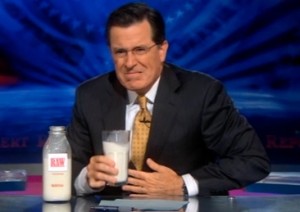Just weeks after health types in the Australian state of Victoria (that’s where Melbourne is) declared a three-year-old had died and four other children sickened from consuming raw milk, natural types are planning a drink-in Saturday to get even more unpasteurized milk on store shelves.
 Three of the four children – all under five — developed hemolytic uremic syndrome, usually associated with shiga-toxin producing E. coli, such as E. coli O157, and the other developed cryptosporidiosis.
Three of the four children – all under five — developed hemolytic uremic syndrome, usually associated with shiga-toxin producing E. coli, such as E. coli O157, and the other developed cryptosporidiosis.
How many others developed milder forms of illness is unknown.
In response to the outbreak in early Dec., Victoria Consumer Affairs Minister Jane Garrett ordered a gag-inducing chemical to be poured into all raw milk sold in stores from Sunday, ensuring no one is able to drink it (raw milk is legally sold as bath milk, side-by-side with pasteurized milk; that would be an expensive bath).
The move has apparently infuriated food activists, who are now planning a protest on Saturday to demand that the unpasteurized product be made available for drinking.
“The government’s approach so far has been a very knee-jerk reaction,” said organic food store owner Rebecca Freer, who is planning the “drink-in” outside the minister’s Brunswick East office.
The Australian Raw Milk Movement is encouraging people to “BYO cup” and drink raw milk outside Garrett’s office.
Supporters of drinking unprocessed milk like Ms Freer dispute the product’s link with the child’s death and instead stress the supposed health benefits from consuming a natural product.
 But they never mention the other kids who developed HUS.
But they never mention the other kids who developed HUS.
“It’s our consumer right to define what we eat and drink,” she said. “Australia is really backwards on this issue.”
After being contacted by Guardian Australia, Freer posted to the Australian Raw Milk Movement’s Facebook wall that she had been contacted by journalists and that “the fight is on.”
“I think it is fair to say we are in the midst of a violent resistance,” she wrote.
Nutritionist Arabella Forge, who will speak at Saturday’s protest, said current food safety laws could be amended to get raw milk on store shelves without compromising food safety.
“What we’re really asking for is a system of regulation that supports safe, raw milk,” she said. “People should have access to this product.”
CSIRO research microbiologists Narelle Fegan and Edward Fox, who have studied raw milk safety on Victorian farms, have both warned against drinking raw milk, even from farms with the highest of standards.
“When the milk comes out of the animal it should be sterile, but then it’s immediately contaminated by its environment,” Dr Fegan said. “When things go wrong they can go wrong pretty badly with people getting seriously ill.”
Dr Fox said there was no evidence that raw milk was more nutritious – a common claim made by raw milk supporters.
“Pasteurised milk is as nutritional as raw milk and it has, due to the pasteurisation process, a lower associated risk,” he said.
Ms Garrett defended her decision to add a bittering agent to raw milk on Thursday, saying it’s meant to prevent illness and death.
“The actions we have taken are designed to stop people from putting themselves and their children at risk,” she said.
Meanwhile, in Adelaide, South Australia, a court heard a temperature rise in samples taken from a farm owned by a couple being prosecuted for selling unpasteurised milk to when it was tested would have caused a “marginal” rise in bacteria readings.
 Moo View Dairy owners Mark and Helen Tyler, who on Wednesday brought a cow to the front of the court building, are contesting charges of breaching the food act by selling the raw milk commercially.
Moo View Dairy owners Mark and Helen Tyler, who on Wednesday brought a cow to the front of the court building, are contesting charges of breaching the food act by selling the raw milk commercially.
The couple have been operating a “House Cow Share Scheme” where people can buy shares in one of their cows which entitles them to a percentage of the milk produced by the herd.
The raw milk was also found to have higher than the legally acceptable amount of bacteria — leading to one of the two counts of selling food in contravention of the food standards code against them in April and May, 2013.
In cross examination on Thursday, SA Dairy Authority general manager John Crosby said that rise would only have had a “marginal affect” on the milk’s bacteria count.
Mr Tyler and shareholder Rachel Tyson, who on Wednesday came to court dressed in a cow suit in a sign of support for the couple, are expected to give evidence on Friday.
